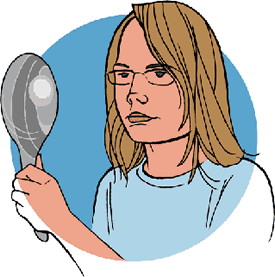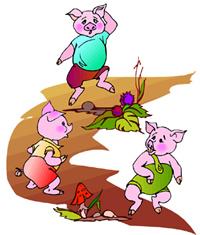Lesson 3.1A: What if the First Impression is the Wrong Impression?
 Have you had to deal with being spoken to or treated poorly because someone had a wrong first impression of you? The first reading for this section is about a boy who was misjudged based on his brothers' actions, even though he had nothing to do with them. Has a teacher or a friend's parent ever had wrong ideas about you? What did you do? Have you had to deal with being spoken to or treated poorly because someone had a wrong first impression of you? The first reading for this section is about a boy who was misjudged based on his brothers' actions, even though he had nothing to do with them. Has a teacher or a friend's parent ever had wrong ideas about you? What did you do?
Dealing with Wrong First Impressions
When you meet new people, you have the opportunity to shape their impressions of you. You could decide to be shy or inquisitive, reckless or snobby. Often it's your decision how people will perceive you. But sometimes it isn't, and then you have to deal with a wrong first impression.
The first multi-paragraph composition we are going to read in this module is called, "I'm Not My Brother; I'm Me." It is a monologue, a piece of writing that is meant to be read aloud by a single narrator, about a boy who has to work hard to correct some wrong impressions other people have about him.
Reading his story will help you to think about being misjudged, and choosing whether or not to stand up for yourself, a problem that also arises in the novel you will read in this module.
 View I’m Not My Brother; I’m Me. Listen carefully to the story, and follow along on pages 54 - 56 of your Sightlines 10 textbook. View I’m Not My Brother; I’m Me. Listen carefully to the story, and follow along on pages 54 - 56 of your Sightlines 10 textbook.
Before you listen, take a few moments and reflect upon a time when you felt someone misjudged you, or a time when you misjudged another person.
As you listen, focus on the following questions:
- What is troubling Jonathan?
- How does Jonathan deal with his problem?
Discussion Prompt |
In a round robin discussion, answer the following question for the monologue, "I'm Not My Brother; I'm Me":
Based on your reading, is either Mark or Jonathan master of his world? Explain. |
Guidelines for contribution:
To have a round robin discussion, respond to a question individually, taking turns in the forum until each person who wishes to respond has had a chance to respond. Your responses are not evaluated or judged or even commented on by other students.
Once all students have had an opportunity to respond, you can respectfully ask for further comment or clarification from another student, or comment on the responses.
The teacher will can ask for clarification questions and comments. Usually, when the group has nothing new to add to the combined responses, you should move on to the next prompt or question. You should try to respond to two people's contributions and read those that respond to yours.
Click here to access the forum now. |
The Journal
 As part of your English 10 course, you will be keeping a journal that will be submitted with each section assignment. As part of your English 10 course, you will be keeping a journal that will be submitted with each section assignment.
What is the Journal?
The Journal is your place to record your ideas, feelings, questions, and reflections about all that you encounter in English 10. Your Journal is, more specifically, a way to practise using the concepts and ideas studied in your course work. The Journal will be collected and marked at the end of each section.
You will be reminded throughout the lessons to answer specific, but informal, Journal questions; at other times, you will be required to build more formal assignments in your Journal.
The intention is for you to have a personal place to take note of, and pride in, all that you have read, learned, and enjoyed in this challenging and rewarding course.
Submitting your Journal also gives your teacher insight into your learning process.
How Do I Manage My Journal?
You may record your Journal entries in a word processing document, such as Microsoft Word. You might even want to find a hard-covered journal to use. The choice is yours. Do keep all of your entries for each module in one place, so you can submit them to your teacher for evaluation (if you have used a hard-copy journal, you can photocopy the required pages and submit the copies by mail, or scan them and attach the scanned pages to your assignment).
On each Journal entry, include the following:
- Name:
- Date:
- Journal Number: (supplied in the assignment)
- Journal Title: (supplied in the assignment)
Example
- Jennifer Jones
- April 21, 2007
- Journal 1.1.1
- Advertising Everywhere
How Will My Journal Be Evaluated?
You will submit your Journal to your teacher at the end of each section. You must submit work of good quality to earn full marks. Do not wait until the last minute to scribble down a few quick ideas.
When you submit all the entries from one section, your teacher will mark each Journal entry, based on the Journal Scoring Guide. Each Journal entry is worth 4 marks, for a total of 12 marks per section. Before you submit, you can take a look at this Journal Scoring Guide to ensure you have included everything you need for a complete Journal entry.

Journal Scoring Guide pdf |

Journal Entry 3.1A:
False Expectations
Create your first Journal entry; then answer the following questions in journal style in the Journal section of the assignment template. Your responses should be approximately 125 words.
Reflect upon a time when someone had a wrong impression of you (perhaps they expected you to act like a sibling, or maybe they lumped you in with a bunch of others and judged you the same as everyone in the group). Did you act more like Mark, or like Jonathan? Explain.
People like to learn in different ways. Some people learn through reading; others through listening; and others through viewing. Some learn through a combination. Based on your experience reading, listening, and viewing this monologue, which style best suites your style? Comment.
|
 Can We Learn About Ourselves from Reading About Others? Can We Learn About Ourselves from Reading About Others?
Through reading, we gain a window into the experiences of other people. Comics, stories, poems, and novels are about people and their experiences - even if the main character is an animal, or a monster, or a superhero! Since we can compare ourselves and our lives to characters we read about, we can learn about ourselves through reading. One part of a story that we can apply to our own lives is called the theme. The theme is the main message of the work - what it says about life or humanity in general.
The theme of a composition or story is the lasting message that it leaves. It is not a moral (a lesson) about life. Rather, it is a truth about life. The following examples of themes from fairy tales and stories will show the difference between a theme statement, and a moral lesson.
Theme vs. Moral
Some themes you might be familiar with come from childhood fairy tales. Perhaps you've heard about "The Three Little Pigs."
"The Three Little Pigs" is a story about three brothers who leave home to live on their own. The youngest pig builds a house of straw, and then goes to play. The middle pig builds a house of sticks, then joins his little brother to play. The oldest pig builds a brick house, and doesn't have time to play. When he is finished, the Big Bad Wolf comes to eat the three pigs, who hide in their houses. The wolf blows down the littlest pig's straw house, and so the little pig runs to hide in the stick house. The wolf blows it down too, and the two pigs run to hide in the brick house. The wolf can't blow the brick house down, and so the three pigs are safe.
The theme of the story "The Three Little Pigs" is "Hard work usually leads to the best results." The oldest brother has a house that the wolf can't destroy, and he provides safety for his brothers. Another theme from the tale is, "Some people will do as little work as they can." The two younger pigs scrape together their homes as quickly as possible so they can play. These pigs pay a price for their lack of effort when their houses are blown down.
Notice that the two themes written above are not absolute statements: they don't say "hard workers ALWAYS earn the greatest rewards," or "ALL younger siblings do as little work as they can." Absolute statements say that something will always or never occur, or that everyone or no one will behave a certain way. Take another look at how the themes are stated: hard work usually leads to the best results; some people will do as little work as they can. Nothing is guaranteed in life, or absolute; and so themes, being truths about life, are not stated as absolutes.
 Other themes you may be familiar with are from famous plays. A theme from Shakespeare's Romeo and Juliet is "Young people may do things against their parents' wishes." Another theme considers the stubbornness of the parents who lost their children because of their family feuding, "Clinging to selfish beliefs may demand a terrible price"; in the play, Romeo and Juliet died because their parents would not let them be together. These theme statements are true: they suggest things that happen in real life, and they do not say that those things will definitely happen, but that they may happen. Other themes you may be familiar with are from famous plays. A theme from Shakespeare's Romeo and Juliet is "Young people may do things against their parents' wishes." Another theme considers the stubbornness of the parents who lost their children because of their family feuding, "Clinging to selfish beliefs may demand a terrible price"; in the play, Romeo and Juliet died because their parents would not let them be together. These theme statements are true: they suggest things that happen in real life, and they do not say that those things will definitely happen, but that they may happen.
In contrast, a moral is a lesson for living, rather than a truth about life. The moral of the story, "The Three Little Pigs," is "always work your hardest to do your best." Notice "always" implies an absolute statement. The pigs learned this lesson from the example of the oldest brother who put in the time and effort to build a brick house. There are moral lessons in virtually every experience, but they can be very hard to live up to! Moral lessons may not be really true statements about how we actually live our lives, but rather what we might aim for.
To summarize, here is a chart showing the main differences between a theme and a moral lesson.
Theme Statements |
Moral Lessons |
- a truth about life
- not an absolute statement
|
- a lesson or rule to live by
- suggests always or never do something (absolute statement)
|
Examples:
- Hard work may lead to the best results.
- Clinging to selfish beliefs may demand a terrible price.
|
Examples:
- Always work your hardest.
- Never let your own selfish ideas get in the way or your children’s happiness
|
Grammar Check Up!
As part of this module, you will be reviewing grammar topics relating to sentence structure, punctuation, and usage. Within each lesson, you will be asked to complete a Grammar Check Up! You will be instructed to complete specific tutorials and practice exercises in Writing on the Run! All the activities are self-marked.
You will be quizzed on the grammar topics covered in each section as part of your section assignment, as well as on your module test. Take time to review the tutorials and exercises as part of each lesson.
 Go to Writing on the Run! and complete the tutorial and exercises on "Sentence Types." Go to Writing on the Run! and complete the tutorial and exercises on "Sentence Types."
Summary
Completing this lesson has helped you to:
- read a monologue, reflect on the main character's experience of being misjudged, and compare it to similar experiences of your own.
- review the literary terms monologue, narrator, theme, and moral.
- consider and comment on the themes of the multi-paragraph composition.
|

